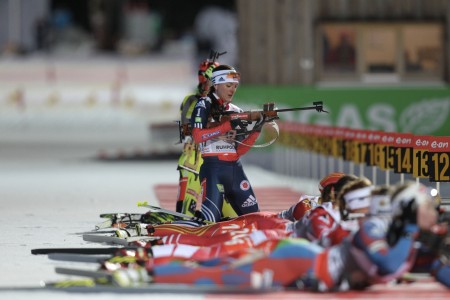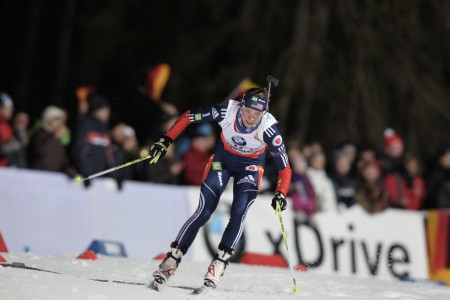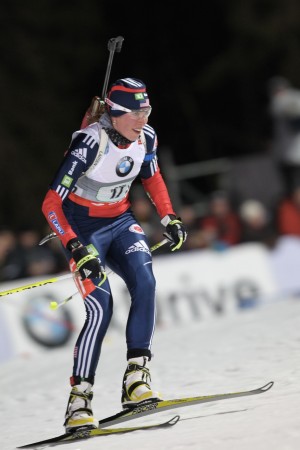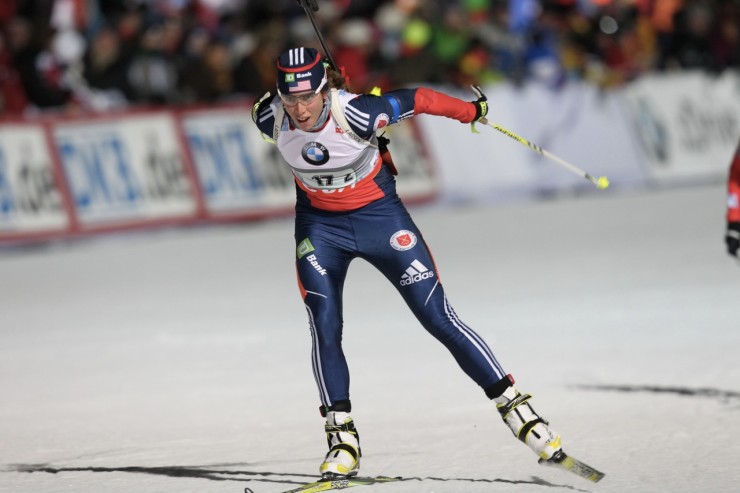
From the rain, fog, and wind of Oberhof, the biathlon circuit picked up and moved to the other side of Germany this week. In Ruhpolding, the World Cup didn’t find much more snow – but conditions did improve. The courses were better salted, meaning that they were fast (albeit rutted) instead of slushy, and for the first time in days it was possible to race without getting rained on.
Another change? The range were so calm that, incredibly, seventeen of the teams in the women’s 4 x 6 k relay made it through the first prone shooting stage without touching their spare rounds. In fact, more than 2/3 of the women in the race cleaned in prone on their first try, including the entire Russian and Italian teams.
Between the good shooting conditions and the speed of the tracks, it made for a tight relay – at least at first.

“When everyone shoots well, then it keeps the field much more compressed and close,” American leadoff skier Annelies Cook told FasterSkier. “There is not that much time to make up spots when it is so fast on the tracks, and you are only skiing 2 k loops. You have to be smart because so much happens in the first leg and athletes are quite bunched together. The main goal is to tag off to your team without a large time deficit and it doesn’t necessarily matter what place as long as you are close to the leaders.”
After the first leg, the top 16 teams were all within 40 seconds of each other and the top four within nine seconds.
But in the second leg, the favorites made a break for it, sort of. On the first loop Ann-Kristin Flatland of Norway moved into the lead from fourth place, then cleaned the prone stage. It was just her first World Cup of the season after missing last year to have a baby, but she was back in a big way.
“I managed to keep my nerves under control,” she told Norwegian broadcaster NRK of her re-debut.
On the second loop, however, she was caught by a new star who she never had to contend with when she won her first World Cup back in 2011: Gabriela Soukalova of the Czech Republic, who recently took her own first victory. Soukalova reined her in, making a small comeback of her own after getting sick over the holiday break and missing the Oberhof races last weekend.
“I was feeling so good after Pokljuka [before Christmas] that I wanted to train, but I was on antibiotics for a few days and had to rest,” Soukalova said in a press conference, speaking of the time that most athletes used as a training block. “I spent a lot of time watching movies.”

In the standing stage, however, both used a spare round. Russia’s Olga Vilukhina cleaned to take the lead. The drama intensified when Miriam Gössner of Germany – who like Soukalova is having a breakout season – caught them after starting the leg in 16th position. At the tag it was Gössner who had the lead, but there were still eight teams within 30 seconds, making it an unusually close race.
That didn’t last long as Norway’s Synnøve Solemdal charged to the front, dropped her competitors, and then used just a single spare round over two stages to hold onto it. By the time she was done skiing the fastest course time of her leg, Norway had a 26-second lead over Russia.
After she tagged off to Tora Berger, it was game over. The reining World champion in the individual race didn’t use a single spare round, shooting what Norwegians are beginning to call a “Tora special” in the standing stage: just 21 seconds in total, and 6.5 of them spent shooting. Not even the men can manage that.
She didn’t slow down on the tracks despite her lead, and would have had the fastest time of the anchor legs if she hadn’t stopped to grab a flag and enjoy her saunter through the finishing stretch. As it was, the Norwegians won by 54 seconds over Russia.
“This was an awesome relay,” head coach Egil Gjelland told NRK. “Today they were solid. I’m impressed.”
Also impressive was Russia: to knock down 40 targets, the team used just one extra bullet. But their ski speed simply was not on par with the Norwegians, who limited themselves to four. In the press conference, Ekaterina Glazyrina and Ekaterina Shumilova explained that they have been helped by having Ruhpolding native Wolfgang Pichler as a coach; they have come to the venue for training camps, and now know the shooting range well.

The battle for third was the first spot to be seriously contested, with the upstart Italian team holding it until the very last loop; it would have been their first podium in the team’s history. But Alexia Runggaldier couldn’t hold on and was passed by Veronika Zvaricova of the Czech Republic, who was just able to outlast Andrea Henkel at the finish line. Italy had to settle for fifth – still one of their best-ever performances.
For the Czech team, it was affirmation of a growing talent base. Not only has Soukalova shot up through the World Cup rankings, but Veronika Vitkova also had her first podium this season. Third place was the team’s first podium since 1997.
The American team hovered around and just outside of the top ten for most of the race, with Cook turning in a strong anchor leg to tag off 12th, 35 seconds out of the lead, despite breaking a pole early on.
“I cleaned prone, which kept me within range of the pack and in standing, I had two misses and used two extra rounds,” Cook wrote in an e-mail. “Standing has been a challenge for me in races, so I was pretty slow and deliberate to make sure I got them. And it was such a relief to hit them! And then I just went for it and tried to pass as many girls as possible in that last lap and it was nice to have the feeling that that was possible.”
She turned in the third-fastest time on that last loop, then handed off to Susan Dunklee, who attacked out of the gate and climbed as far up as eighth before succumbing to two penalties in the standing stage. Like Cook, she had the seventh-fastest course time of her competitors.
“That was a fun race tonight and everybody put together a solid leg for our team,” she told FasterSkier. “Night racing in front of big crowds is a blast! A little competition and adrenaline was exactly what I needed to reset my body, and more importantly, my head after being sick last week. The legs were feeling a little torched by the end but I got to ski behind Miriam [Gössner] for almost a loop and a half, which was great.”
After Dunklee handed off in 11th place, still only 48 seconds out of first, Sara Studebaker and Lanny Barnes took over, using two and three spare rounds, respectively. At the end of the day, the team was 13th, 4:29 behind Berger and the Norwegians.While the team seemed happy with their performance, they’re also eager to do better next time.
“We can’t wait to give the relay another go next week in Antholz,” Dunklee wrote.
For Cook, the feelings were even stronger after racing around in front of Ruhpolding’s famous crowds.
“I felt really great today and had the aggressive strong feeling that you don’t get very often but when you do, it reaffirms everything you work for,” she wrote. “Now we are all amped up and not going to fall asleep for a while!”
The Canadian women finished one spot and 17 seconds back in 14th, with nine spare rounds to the Americans’ eight. Both teams avoided the penalty loop.
Action continues tomorrow in Ruhpolding with the men’s 4 x 7.5 k relay.

Chelsea Little
Chelsea Little is FasterSkier's Editor-At-Large. A former racer at Ford Sayre, Dartmouth College and the Craftsbury Green Racing Project, she is a PhD candidate in aquatic ecology in the @Altermatt_lab at Eawag, the Swiss Federal Institute of Aquatic Science and Technology in Zurich, Switzerland. You can follow her on twitter @ChelskiLittle.



